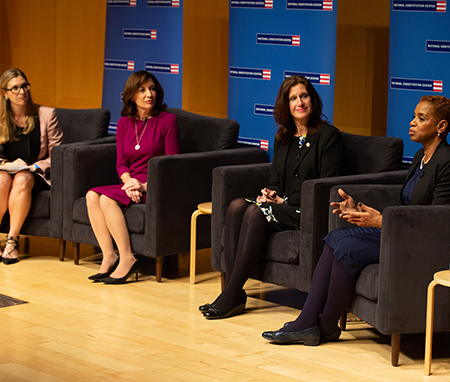How did America’s founders view religious liberty? And what does it mean today? Join constitutional law experts Marci Hamilton, author of God vs. the Gavel: The Perils of Extreme Religious Liberty, and Michael McConnell, co-author of Agreeing to Disagree: How the Establishment Clause Protects Religious Diversity and Freedom of Conscience, for a special Constitution Day discussion to celebrate the opening of the Center’s new First Amendment gallery. Jeffrey Rosen, president and CEO of the National Constitution Center, moderates.
Video
Podcast
Participants
Marci Hamilton is a professor of practice in the Department of Political Science and Fox Family Pavilion non-resident senior fellow in the Program for Research on Religion at the University of Pennsylvania. She is also the founder and CEO of CHILD USA. She is the author of numerous books and articles, including God vs. the Gavel: The Perils of Extreme Religious Liberty (2014). She served on the scholar advisory board for the National Constitution Center’s new First Amendment gallery.
Michael McConnell is the Richard and Frances Mallery Professor and director of the Constitutional Law Center at Stanford Law School, and a senior fellow at the Hoover Institution. From 2002–2009, he served as a circuit judge on the United States Court of Appeals for the Tenth Circuit. He has authored numerous articles and books, including most recently Agreeing to Disagree: How the Establishment Protects Religious Diversity and Freedom of Conscience (2023). He served on the scholar advisory board for the National Constitution Center’s new First Amendment gallery.
Jeffrey Rosen is the president and CEO of the National Constitution Center, a nonpartisan nonprofit organization devoted to educating the public about the U.S. Constitution. Rosen is also a professor of law at The George Washington University Law School and a contributing editor of The Atlantic.
Additional Resources
- National Constitution Center’s First Amendment gallery
- Marci Hamilton, God vs. the Gavel: The Perils of Extreme Religious Liberty (2014)
- Marci Hamilton, “‘Warped history’: How the U.S. supreme court justified gutting gay rights,” The Guardian (Aug 23, 2023)
- “Prof. Michael McConnell (Stanford) on 303 Creative (the Web Site Designer / Same-Sex Wedding Case),” Volokh Conspiracy (Dec. 2022)
- Michael McConnell, Agreeing to Disagree: How the Establishment Clause Protects Religious Diversity and Freedom of Conscience (2023)
Excerpts from the interview
On the Establishment Clause
Marci Hamilton: And so what the Establishment Clause is supposed to do is it is supposed to put boundaries on the power-seeking instincts of religious organizations and believers. So that it's not a servant to religion, it's actually a limitation on both the government and on religion. And in my view, that is supported by the history and was certainly was supported at the Supreme Court until relatively recently. The conservative Supreme Court has now rolled back most of the limitations that would have protected us from overreaching religion. So that we have come to a point in history where religious entities now have a direct line for school funding for their sectarian schools from the government. Where they demand mandated exemptions so they do not have to obey the laws that anybody else does. For example, Title VII, the right, because you're religious, not to hire and not to keep LGBTQ employees. So we're at a dangerous tipping point in my view, and it has to do with power first and foremost and not just about enlarging the size and the amount of religious liberty.
On the Exercise Clause
Michael McConnell: So what the Free Exercise Clause says is that the government - we now treat “Congress” as meaning applying the limitation to a state and local government as well - cannot prohibit the free exercise of religion. When you look at this against its historical backdrop of natural rights law, this is not an absolute right, never has been understood as an absolute right. You, you can't... if you have a religious conviction that you ought to murder your law professor, you can't do that. The way in which the founders would have articulated this is that this right does not extend to the disturbance of public peace and order or the private rights of others. This does not, however, set up some sort of an all-purpose harm principle where anytime, an exercise of free exercise right has any harm to someone else. Every constitutional right, when exercised in particular ways, in particular contexts, can do injury to somebody else. When a criminal defendant invokes their Fourth Amendment rights, it means that the victim of that crime is very likely not going to get justice. Freedom of speech can certainly, harm people.
Full Transcript
View Transcript (PDF)
This transcript may not be in its final form, accuracy may vary, and it may be updated or revised in the future.
Continue the conversation on Facebook and Twitter using @ConstitutionCtr.
Sign up to receive Constitution Weekly, our email roundup of constitutional news and debate, at bit.ly/constitutionweekly.
Please subscribe to Live at the National Constitution Center and our companion podcast We the People on Apple Podcasts, Stitcher, or your favorite podcast app.
Continue the conversation on Facebook and Twitter using @ConstitutionCtr.
Sign up to receive Constitution Weekly, our email roundup of constitutional news and debate, at bit.ly/constitutionweekly.
Please subscribe to Live at the National Constitution Center and our companion podcast We the People on Apple Podcasts, Stitcher, or your favorite podcast app.







